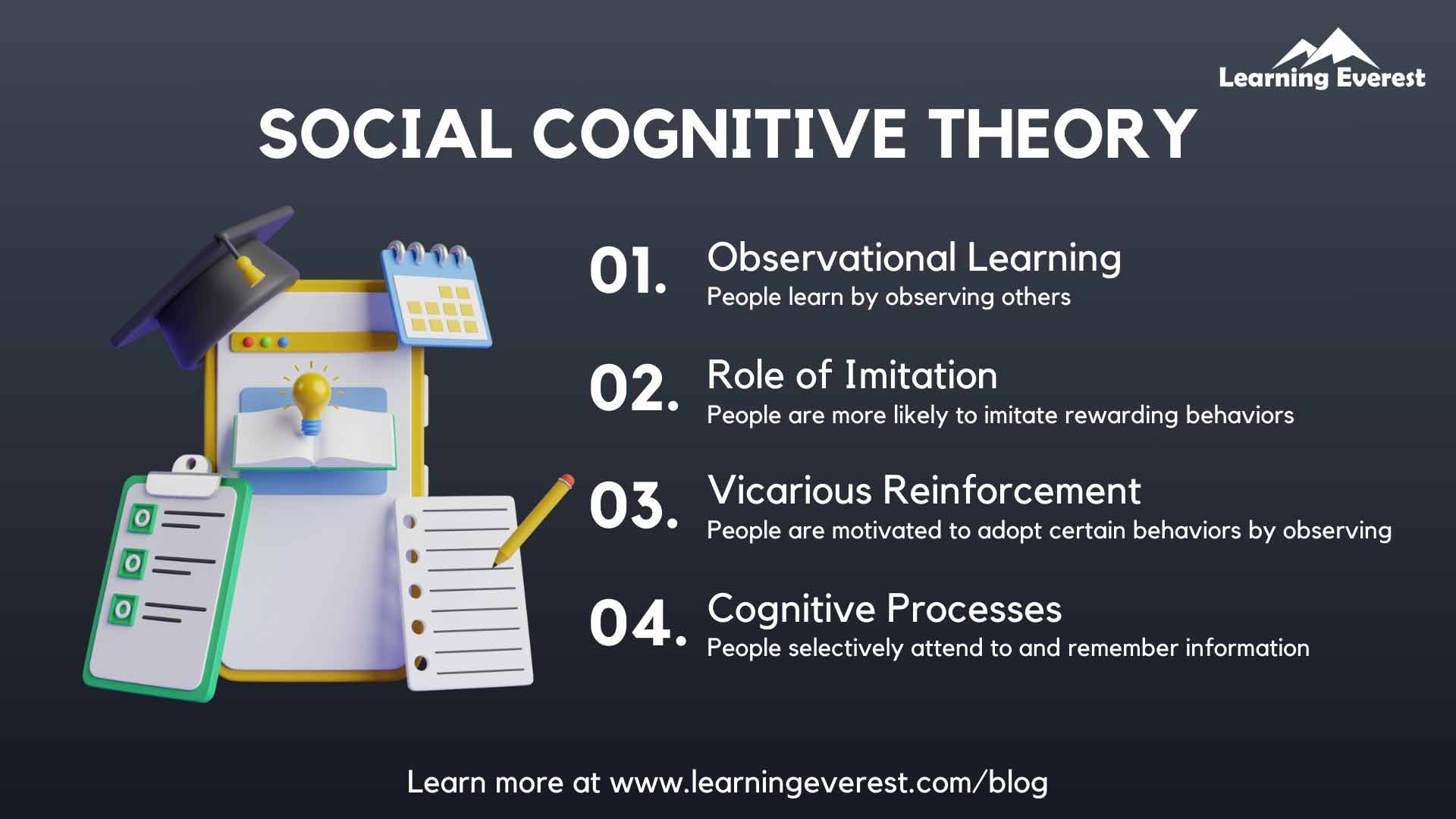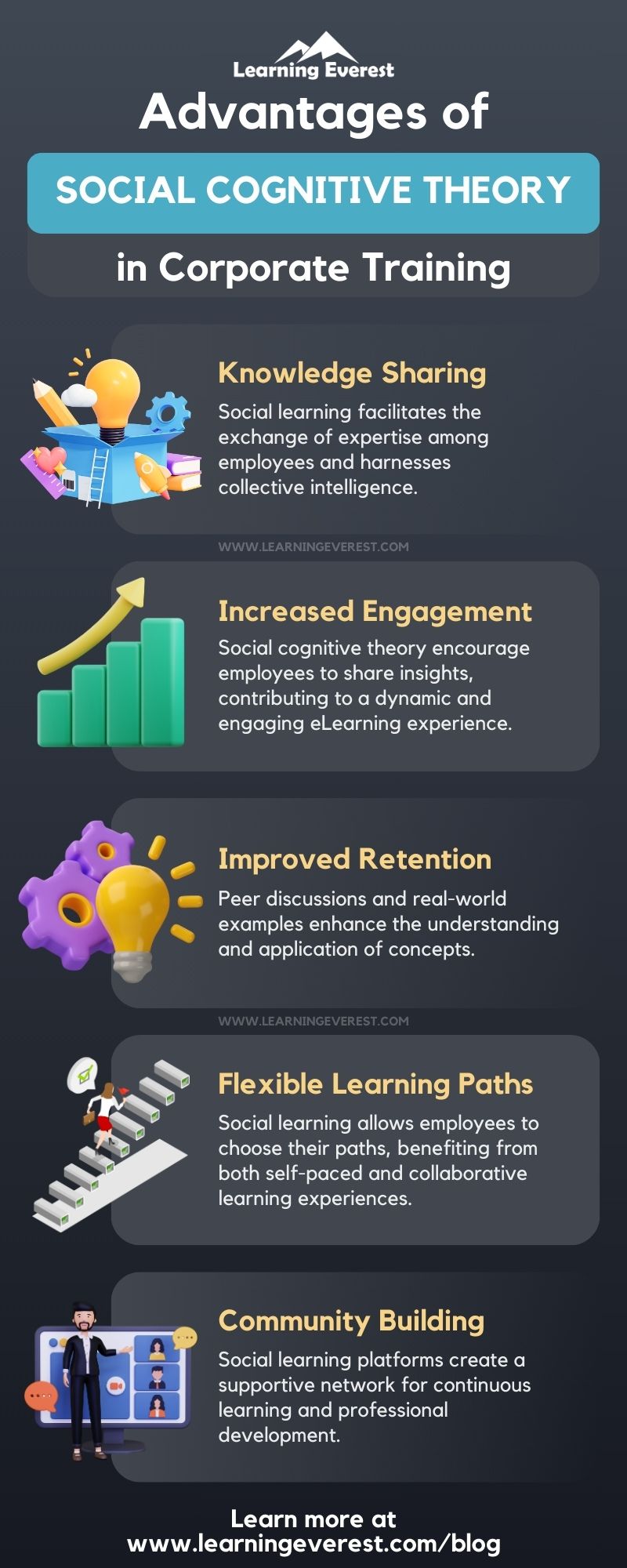Social cognitive theory (SCT), primarily known as the social learning theory (SLT), was developed in the 1960s by Albert Bandura. It developed into the social cognitive theory in 1986 and states that learning occurs in a social context with a dynamic and reciprocal interaction of the person, environment, and behavior. The unique feature of Bandura’s social cognitive theory is the emphasis on social influence and its emphasis on external and internal social reinforcement. In this blog, we will discuss this in detail.
Table of Contents
- What is Social Cognitive Theory?
- What are the Conditions for Social Learning?
- Applications of Social Learning Theory in Corporate Training
- Limitation of Social Cognitive Theory
- Infographic
- Knowledge Check!
- Frequently Asked Questions (FAQs)
- 1. What concept is central to Bandura’s social cognitive theory?
- 2. What are the 4 concepts of social cognitive theory?
- 3. Why is social learning important?
What is Social Cognitive Theory?
The social cognitive theory explores how individuals acquire and sustain behavior while also considering the social environment in which individuals perform the behavior. It incorporates past experiences and influencing factors such as reinforcements, expectations, and expectancies, ultimately shaping whether a person engages in a specific behavior and why. This theory aims to elucidate how individuals regulate their behavior through control and reinforcement, striving for goal-directed actions that endure over time. Originally rooted in the social learning theory, the addition of self-efficacy marked the evolution of the theory into social cognitive theory. The first five constructs were developed as part of the social learning theory; the construct of self-efficacy was added when the theory evolved into social cognitive theory.

Social Cognitive Theory
1. Reciprocal Determinism
Reciprocal determinism is when a person’s experiences, the world around them, and their actions all influence each other. It is like a continuous interaction where what you’ve learned, your environment, and how you behave all affect one another.
2. Behavioral Capability
Behavioral capability means having the knowledge and skills to do something. To succeed in a behavior, you need to know what to do and how to do it. People learn from the outcomes of their actions, which also affect their behaviors.
3. Observational Learning
Observational learning is the idea that you can watch others do something and then copy them. It’s like modeling behavior. If you see someone do something successfully, you might be able to do it, too.
4. Reinforcements
Reinforcements are responses to your actions that impact whether you’ll keep doing that behavior or stop. These responses can come from yourself or the environment, and they can be positive or negative. It’s closely linked to how your behavior and the environment interact.
5. Expectations
Expectations are what you think will happen because of your actions. You think about the consequences before doing something, and these expectations can influence whether you succeed. Your expectations come from past experiences.
6. Self-efficacy
Self-efficacy is about how confident you feel in your ability to do something. It’s unique to social cognitive theory. Your confidence is influenced by your abilities, personal factors, and the environment, including obstacles and support.
What are the Conditions for Social Learning?
Effective knowledge acquisition hinges on specific conditions for social learning. These conditions, derived from behavioral theories and social cognition perspectives, illuminate the key factors that influence the success of observational learning:
Attention
To glean insights from a knowledge acquisition model, learners must focus on observable human learning behaviors. Disturbances in attention, whether due to distractions, illness, or fatigue, can impede the absorption of modeled behaviors in the corporate training environment.
Retention
Social cognition theorists emphasize the importance of memorizing witnessed behaviors as the second condition for observational learning. For learners, the ability to recall social behaviors significantly impacts the likelihood of successfully implementing them in their professional activities.
Reproduction
Replicating observed behaviors involves both mental and physical capabilities. While a learner may witness a specific task, such as a complex business process, the successful reproduction of it depends on their own abilities and the complexity of the task at hand.
Motivation
Motivational factors take center stage in corporate training, serving as catalysts for observational learning. Without a compelling reason to imitate modeled behaviors, even with adequate attention, retention, and reproduction, the absence of motivation can hinder the successful application of acquired knowledge. Here, emotional experiences, positive reinforcement, and punishment play pivotal roles in fostering motivation.
For example, in a scenario-based corporate training module, imagine a virtual workplace where a learner navigates through simulated tasks. As they witness a simulated colleague receiving praise from a virtual supervisor for successfully completing a task, it serves as inspiration, encouraging the learner to actively engage in similar activities within the simulated environment. Conversely, encountering consequences, like observing a simulated colleague facing repercussions for a mistake, becomes a powerful motivator for the learner to make decisions that avoid similar errors within the context of scenario-based training.
Applications of Social Learning Theory in Corporate Training
Social cognitive theory can have a number of real-world applications. Social learning can be utilized to teach people positive behaviors in corporate scenarios. The social cognitive theory, proposed by Bandura, serves as a valuable framework for corporate trainers aiming to cultivate positive behaviors and mitigate counterproductive ones in the workplace. By highlighting the significance of observation and imitation in behavior and development, this theory provides a fresh perspective for guiding learners.
To maximize its potential, trainers can exemplify desirable behaviors, recognizing that learners are more likely to emulate the actions of influential figures in their professional lives. Establishing a supportive and respectful learning environment becomes crucial in instilling these positive attitudes and behaviors among learners.
Furthermore, grasping the cognitive processes underlying human behavior allows trainers to devise more effective learning strategies. Incorporating verbal instructions alongside demonstrations and role-playing activities reinforces desired behaviors, enhancing learners’ cognitive understanding and fostering essential social skills.
Additionally, trainers can harness the influence of peer dynamics to shape learners’ behavior. By fostering a collaborative learning environment and promoting positive social interactions, trainers can create a synergistic effect that reinforces the adoption of desirable behaviors.
Peer-led activities and collaborative projects can facilitate the exchange of ideas and experiences, enabling learners to glean insights from each other’s successes and challenges.
Ultimately, integrating the principles of Bandura’s Social Cognitive Theory into corporate training practices can significantly impact learners’ overall professional development.
Limitation of Social Cognitive Theory
Social cognitive theory has several limitations, which should be considered:
- The assumption that changes in the work environment will automatically result in changes in the learners may not always hold true.
- The theory’s loose organization and emphasis on the interplay between person, behavior, and environment make it unclear which factor has a more significant influence on actual behavior in a corporate setting.
- The theory’s heavy focus on learning processes overlooks biological and hormonal predispositions that can impact behaviors in a corporate context, irrespective of experience and expectations.
- Insufficient attention is given to emotion and motivation, aside from references to experience, limiting its applicability in addressing these crucial factors in corporate training.
- The broad-reaching nature of the theory makes it challenging to operationalize effectively in the context of focused corporate training programs.
While Social Cognitive Theory considers various levels of the social-ecological model for behavior change, its application to specific corporate training scenarios may pose challenges. It’s important for corporate trainers to be mindful of these limitations and consider alternative approaches.
Infographic
We hope you enjoyed reading this article. You can also check our article on the Implications of Bandura’s Social Learning Theory.
Knowledge Check!
Frequently Asked Questions (FAQs)
1. What concept is central to Bandura’s social cognitive theory?
The social cognitive theory is the way individuals acquire and maintain behavior while also considering the social environment in which individuals perform the behavior.
2. What are the 4 concepts of social cognitive theory?
According to the social cognitive theory, the learning process is divided into four stages: attention, retention, reproduction, and motivation.
3. Why is social learning important?
The principles of social learning are beneficial for businesses and every social and behavior change communication program that seeks to change social behaviors, especially those that are complicated or require interactions with others.






